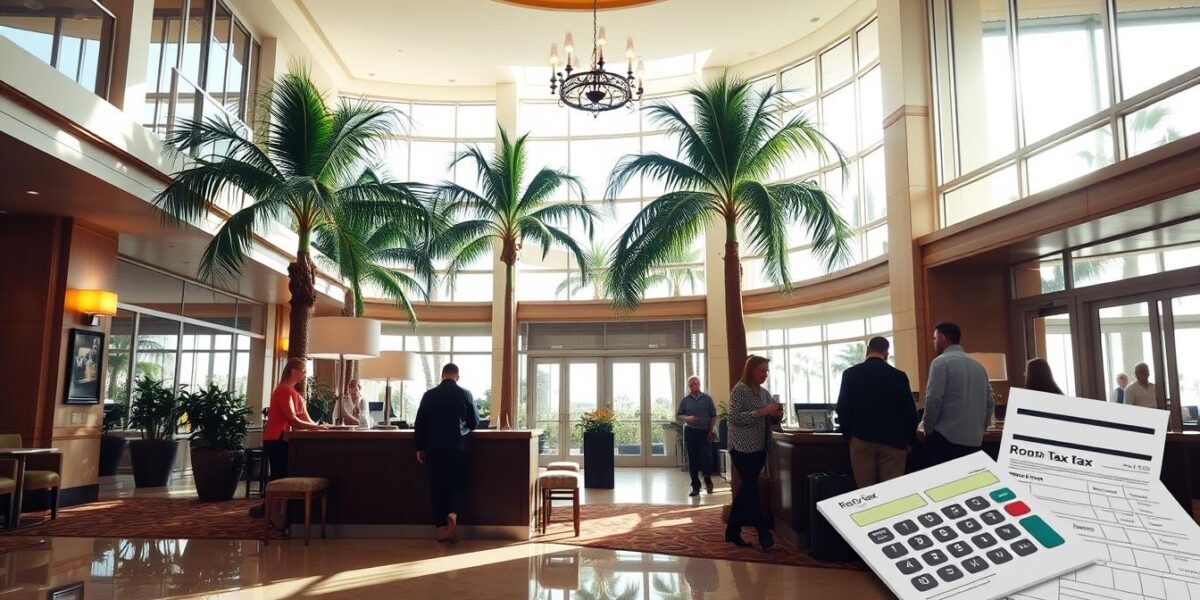Wondering does california have a hotel tax? Learn about California’s transient occupancy tax rates, exemptions, and what you can expect to pay when booking accommodations
Did you know California doesn’t have a statewide hotel tax? Instead, cities and counties can set their own tax on short-term stays. This tax, called transient occupancy tax (TOT), can change a lot depending on where you are. When you stay, you’ll pay this tax on top of your room rate. Property owners collect and send it to local governments. Does California Have a Hotel Tax?
Key Takeaways
- California has no statewide hotel tax, but cities and counties can impose their own transient occupancy tax (TOT)
- TOT rates vary by location, with revenue often used to fund local tourism, infrastructure, and community projects
- Property owners are responsible for collecting and remitting TOT to the appropriate local authorities
- Guests pay TOT in addition to the room rate when staying at accommodations for 30 days or less
- Understanding the regional differences in TOT is crucial for proper tax management and compliance in California’s hospitality industry
Understanding California’s Transient Occupancy Tax (TOT)
In California, people staying in short-term places like hotels and vacation rentals pay a tax called the Transient Occupancy Tax (TOT). This tax is between 10% to 14% of the room cost. It’s different from the state’s sales tax and is collected by the places you stay.
What is Transient Occupancy Tax?
The Transient Occupancy Tax (TOT) is a tax for those staying in hotels and vacation rentals for under 30 days. It helps local areas by funding tourism, roads, and community services.
How TOT Differs from Other Taxes
The TOT is just for hotels and motels, unlike the state’s sales tax. It’s a local tax, so rates can change in different places in California. Cities and counties can add their own taxes on top of the state’s TOT.
Duration Requirements for TOT
The TOT in California is for stays under 30 days. Staying longer than 30 days might mean you don’t have to pay it. But, the rules can change in different places, so it’s good to know the local rules.
The Transient Occupancy Tax is key to California’s tourism. It helps the state grow and improve local areas. Knowing about this tax helps everyone follow the rules and enjoy California’s tourism.
Does California Have a Hotel Tax: State vs Local Implementation
California does not have a statewide hotel tax. Instead, cities and counties can set their own Transient Occupancy Tax (TOT). This means different california hotel tax rates and rules in each place. Local governments handle the taxes and make sure everyone follows the rules.
Property owners need to know the local hotel taxes california rules in their area. This is to make sure they meet all california city hotel taxes requirements.
There’s no single california hotel tax rates rule for the whole state. So, local hotel taxes california can change a lot from one place to another. For instance, Los Angeles and San Diego have different tax rates. It’s important for property owners to keep up with these changes to avoid fines.
| City | Transient Occupancy Tax (TOT) Rate |
|---|---|
| Los Angeles | 14% |
| San Francisco | 16% |
| San Diego | 10.5% |
Understanding california hotel tax rates and local hotel taxes california is key. It helps property owners meet their tax duties and avoid fines. Knowing the california city hotel taxes in your area is vital for your business’s success.
California Hotel Tax Rates by Major Cities
California’s big cities have different hotel tax rates. These rates change how much you pay for a hotel room. It’s important for hotel owners to know these rates to follow the law.
Los Angeles TOT Rates
Los Angeles charges a 14% Transient Occupancy Tax (TOT). This tax is on the total cost of your room. Hotel owners pay this tax to the city.
San Francisco Hotel Tax Structure
San Francisco’s hotel tax is more complex. It starts with a 14% TOT rate. Then, there’s a 0.195% Tourism Improvement District fee and a 0.25% Special Tax for Moscone Center. This makes the total tax rate about 14.45%.
San Diego Accommodation Taxes
San Diego’s TOT rate is 10.5%. There’s also a 2% Tourism Marketing District fee. This makes the total tax 12.5% in certain areas.
Hotel tax rates can change. It’s key for owners to keep up with these changes. This helps avoid fines and keeps them in good standing with the law.
| City | Transient Occupancy Tax (TOT) Rate | Additional Taxes/Assessments | Total Accommodation Tax |
|---|---|---|---|
| Los Angeles | 14% | – | 14% |
| San Francisco | 14% | 0.195% Tourism Improvement District, 0.25% Special Tax for Moscone Center | Approximately 14.45% |
| San Diego | 10.5% | 2% Tourism Marketing District Assessment | 12.5% |
How Hotel Tax Collection Works in California
In California, the Transient Occupancy Tax (TOT) is a key part of the state’s taxes. Property owners must collect this tax from guests and send it to local tax offices. This tax is usually added to the room rate and collected when guests pay.
To follow the california hotel tax collection rules, property owners need to register with their local government and get a TOT certificate. This certificate proves they can collect the tax. The TOT collection process and when to pay it vary by area, with some needing monthly payments and others quarterly or yearly.
The hotel tax remittance process involves calculating the TOT based on the room rate and tax rate. Then, property owners must send the collected tax to the right tax office on time. Not following these rules can lead to penalties and interest, hurting a property owner’s finances.
| City | TOT Rate | Remittance Frequency | Penalty for Late Payment |
|---|---|---|---|
| Vallejo | 11% | Monthly | 10% on the first day, up to 25% for fraud |
| San Diego | 10.5% TOT + 2% TMD Assessment | Monthly | Penalties cannot be waived |
Keeping accurate records is crucial for property owners to meet the california hotel tax collection rules. They must keep detailed records of guest stays, room rates, and tax calculations for at least three years. This is to support any claims or disputes during audits or reviews.
Understanding the TOT collection process and meeting their duties helps property owners avoid legal and financial issues. It also helps them contribute to the local economy and community through the hotel tax remittance process.
Registration and Compliance Requirements for Property Owners
If you own property in California, you must register with your local tax authority. This is to get a TOT certificate before you can collect the Transient Occupancy Tax (TOT) from guests. This step is key to follow the state’s hotel tax compliance and california lodging tax requirements.
Getting Your TOT Certificate
To get a TOT certificate, you need to apply, share your property details, and pay any fees. After approval, you’ll get your certificate. It must be shown clearly at your rental property.
Filing Requirements and Deadlines
- Submit tax returns regularly: The time and due dates for filing TOT returns differ by area. They are usually monthly or quarterly.
- Pay taxes on time: You must send the TOT funds you’ve collected to the local tax authority by the deadline. This avoids late penalties and interest.
Record Keeping Guidelines
Keeping accurate records is vital for hotel tax compliance. You must track guest details, payment info, and the taxes you’ve collected. This info might be needed during audits or disputes.
Not following registration, filing, or payment rules can lead to big penalties and interest. It’s important for property owners to keep up with the latest california lodging tax requirements. This helps avoid problems and makes tax reporting easier.
Tax Collection Through Online Booking Platforms
The world of airbnb tax collection california, vrbo hotel tax, and online platform TOT collection is complex. Some platforms, like Airbnb, collect and send Transient Occupancy Tax (TOT) for hosts in some California areas. But, not all hosts get this service. Property owners must still make sure they follow tax rules, even if platforms help with collection.
Even if platforms collect taxes, hosts might still have to register with local authorities and file their own taxes. It’s key to check how your area and platform work together. Not following tax rules can lead to penalties and fines, so it’s important to stay up to date.
About 30 US states have taxes like California’s TOT. The tax rate can change a lot, with Los Angeles at 14% and San Diego at 10.50%. The tax guests pay also depends on where the rental is.
Some owners use third-party services like Avalara to help with taxes. Avalara keeps track of tax changes, helps with calculations, and prepares returns and payments for different places.
“Remitting taxes involves identifying collected taxes and the proper authorities for remittance. Different jurisdictions may require separate remittances to state, county, and city, making the process complex.”
Understanding online platform TOT collection in California takes effort and focus. By knowing what’s needed for your area and using available tools, hosts can follow airbnb tax collection california and vrbo hotel tax rules.

Impact of Hotel Taxes on Tourism and Local Economy
California’s Transient Occupancy Tax (TOT) is key to its tourism and local communities. The tax revenue helps promote tourism, improve infrastructure, and fund community services.
Revenue Distribution
In California, TOT revenue goes to different places. Cities use it for marketing, development, and public projects. For example, San Francisco’s Grants for the Arts program gets a lot of its funding from hotel taxes. This supports the city’s arts and culture.
San Francisco also launched a new marketing campaign with Expedia. It led to more hotel bookings, helping the local economy.
Community Benefits
Higher hotel taxes might affect visitors, but they also improve the tourist experience. In Savannah, Georgia, a tax increase from 6% to 8% is expected to bring in $45 million more. This money will help the city, Visit Savannah, and tourism projects.
In Sarasota, Florida, the Visit Sarasota organization brings in about $2 billion a year. This is thanks to a six percent tax on short stays. The money goes to marketing, beach projects, and more, making visits better and supporting locals.
The smart use of california tourism taxes and TOT revenue distribution greatly benefits California’s tourism and communities. It helps them grow and stay strong over time.
Common Exemptions and Special Cases
In California, some guests or stays might not have to pay the Transient Occupancy Tax (TOT). Knowing about california hotel tax exemptions is key for property owners. It helps them follow the rules and avoid fines.
Long-term stays over 30 days are often tax-free. Government workers on duty and diplomats also get a break. Some places might not charge tax for certain types of stays or events. So, property owners need to know the local rules well.
To get an exemption, owners must keep the right documents. This could be proof of government job or how long someone stayed. If they don’t, they could face big fines and interest. It’s very important for owners to keep up with california hotel tax exemptions and TOT special cases.

There are also new laws like the California Junk Fee Law, SB 478, and SB 1524. These laws want to make things clearer and limit extra fees. By keeping up with these changes, property owners can make sure their business follows the rules. This way, they can avoid legal and financial problems.
Conclusion
It’s important for property owners to understand and follow California’s Transient Occupancy Tax (TOT) rules. Even though there’s no statewide hotel tax, local TOT rates and regulations vary a lot. To avoid penalties, property owners must register, collect taxes, keep accurate records, and pay taxes to local authorities.
Knowing local tax laws and using available resources can help. Getting professional advice when needed is also key. This way, you can handle TOT compliance well. By following lodging tax best practices, you help the travel industry’s reputation and meet your tax duties in California.
The California hotel tax summary in this article gives a detailed look at the state’s tax scene. It helps you make smart choices and stay in line with TOT compliance tips. Being careful and proactive helps you manage your taxes well. This also helps the local economy grow.


